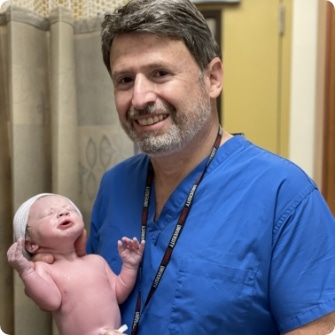
QUICK LINKS

How a Twin Pregnancy Occurs
Nowadays, twin and multiple births are more common than they once were due to many factors including the advancing age of mothers and the use of fertility drugs.
When it comes to twins, there are different types, such as:
“I highly recommend Dr. Tepper!He is highly professional, experienced, and calming. My pregnancy and birth were such a positive experience thanks to him and his lovely staff at the clinic.”
SEE MORE- Fraternal twins (dizygotic): In some cases, a woman’s ovary will release two eggs, and two separate sperm will fertilize each egg which results in fraternal twins, or non-identical twins.During pregnancy, the developing babies will receive food and oxygen from their mother through the placenta and umbilical cord. Fraternal twins have separate placentas and umbilical cords. These types of twins can be the opposite or same-sex and their genes are as unique as any other brother or sister.
- Identical twins (monozygotic): Sometimes, a fertilized egg will split within a few days of conception to create identical twins. These twins come from one zygote and are of the same sex. Furthermore, there are three different types of identical twins, distinguished by how they share a placenta and amniotic sac. These include:
- Diamniotic-dichorionic Twins: Twins that have their own inner membrane and amniotic sacs but may or may not share the same placenta.
- Diamniotic-monochorionic Twins: Twins who share an inner membrane and placenta but are in separate amniotic sacs.
- Monoamniotic-monochorionic Twins: Twins who share an inner membrane, amniotic sac, and placenta.

MEET DR. ALEX TEPPER
Welcome to my practice. Let me introduce myself and my practice philosophy. I am a board certified OB/GYN in practice for over 20 years and have been a solo-practitioner on the Upper East Side of Manhattan since 2000. All deliveries are performed at The Mount Sinai Medical Center where I went to medical school and at Lenox Hill Hospital.
Who is More Likely to Have Twins?
There are some women who are more likely than others to give birth to twins due to a number of factors, including:
- Advanced age of the mother: Women who become pregnant in their 30s and 40s have higher levels of the sex hormone estrogen than younger women. This means that their ovaries are triggered to produce more than one egg at a time.
- Heredity: If you are a fraternal twin, have already had fraternal twins, or have siblings who are fraternal twins, you are more likely to conceive fraternal twins.
- Number of previous pregnancies: The more pregnancies a woman has already had, the higher her chances of conceiving twins.
- Race: Black women of African descent have the highest chances of conceiving twins.
- Assisted reproductive techniques: Procedures that rely on fertility drugs to stimulate the ovaries may cause several eggs to release per ovulation.
BOOK AN APPOINTMENT
Whether you are a new or returning patient, Dr. Tepper can assess your concerns and discuss your options to find the most comfortable and convenient care for you. To get started, call our office to set up an appointment.
CALL FOR APPOINTMENTGestation and the Birth of Twins
While the normal length of gestation for a single baby is 40 weeks, gestation for twins is usually around 38 weeks. This is because twin pregnancies demand more from a mother’s body, and the babies may not be able to receive the nutrients they need if they stay in utero for 40 weeks. Because twins are usually a bit premature, they are more likely to have lower birth weights.
Twin pregnancies may also come with a higher risk of complications or difficulties. Because of this, women who are pregnant with twins are encouraged to give birth in a hospital rather than at home. The process of labor is the same with twins as when single babies are born, which may include vaginal birth or cesarean section (C-section).
Contact Us to Learn More
If you are pregnant with twins or are trying to become pregnant and are more likely to give birth to twins, please contact our office today to schedule your appointment with Dr. Tepper. We will be happy to speak with you regarding your pregnancy and how to best ensure a safe and enjoyable experience.
Our Blog

Preterm Labor: Are You At Risk?

Postpartum Depression: Symptoms, Causes, and Treatments



